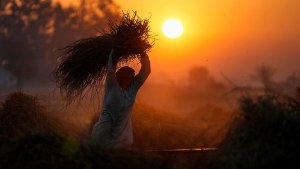Inspiring Action: Getting Youth Involved in Agriculture
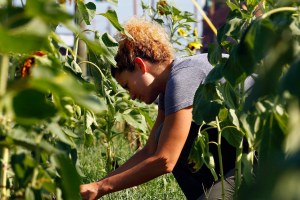 Play Podcast
Play Podcast
About the Episode
To create the next generation of thought leaders in food and agriculture, the food and agriculture industry must recruit more young people. Without their help, it will be impossible to uplift and fix the food system. In this episode of Youth in Agriculture: Transforming Local Food Systems, Hannah Bernstein and Sarah Zoubek discuss how to get young people involved and what role they can play in ending food insecurity.
[Intro music.
Natalie Burdsall: INTRO: Hello and welcome to the limited podcast series “Youth in Agriculture: Transforming Local Food Systems,” produced by the Chicago Council on Global Affair’s Center on Global Food and Agriculture. Today, we will be listening in on a conversation between Hannah Bernstein, a sophomore at Ohio State University, and Sarah Zoubek, the Associate Director of the Duke University World Food Policy Center.]
Hannah Bernstein: Hi, I'm Hannah Bernstein. I'm a sophomore at Ohio State University. I'm studying agricultural engineering and agribusiness as a minor. I kind of got into the food space through the World Food Prize around my sophomore year of high school, and I've been involved with them since then. I'm just really excited to be here. And thank you so much for having me.
Sarah Zoubek: And I'm Sarah Zoubek. I'm the Associate Director of the Duke University World Food Policy Center. We’re based in North Carolina. I've got an outpost up in Washington, D.C., at our Duke’s D.C. office. And our center is very focused on kind of examining more holistic food systems issues. Our founding director was really in this space around food policy in the light of obesity prevention and public health. And kind of had a moment where he said, “Wow, I'm never going to be in the room with someone working on agriculture and I should be,” so, founded our center to work a little bit more holistically on issues and so great to be here today.
I’d love to know, Hannah, what gets you excited about working in global food and agriculture? You know, you are just starting out and there are so many avenues you could have chosen. Why this one?
Hannah Bernstein: Honestly, it came from more of a local perspective. I'm from Athens, Ohio, and for the general world, that's where Joe Burrows is from. And so, when Joe Burrow won the Heisman, he brought a lot of attention into my county because they have one of the highest food insecurity rates of Ohio. But we are also actually a food-producing area. And so, growing up with that kind of dichotomy was really interesting because it would be like, well, why can we do all of these things and then we can't do other things? And so, I think it's really important that we make it a localized issue as well as a globalized one. But I didn't really come to that perspective until I got involved with the World Food Prize. As a 15-year-old on a plane going to Iowa and hearing and seeing all these professionals talking about our food system on a global perspective, it really struck me. It's like, wow, everyone is doing all of this great work, but I feel like at the end of the day my community is kind of being ignored because we’re in a food producing area and in the world's leading country.
Sarah Zoubek: And so, Hannah, that makes me also think of the question, what could a professional like me learn from young people in agriculture?
Hannah Bernstein: I think that is something I'm still learning about a lot. I think it's very interesting when I get to connect with professionals like you. You are looking at our world and our global food system at such a large level. It is like, how do we bring this problem that has so many dimensions and look at it in these tiny aspects, while also being able to apply innovation and technological solutions into solutions that an everyday person can have? And I think that was a project that I was working on when I worked... when I initially started with the World Food Prize and I was interning with the International Maize and Wheat Improvement Center where they're talking about, you know, these big global problems. But when you come down and you're working with a Mexican farmer, they don't care about the big solutions. They care about a small, localized one. And so I kind of want to volleyball that back to you. How do we bring these solutions to local communities and into a smaller thing that normal day people can deal with?
Sarah Zoubek: Sure. Well, I mean, you know, definitely the answer to global issues is local, I think... You know, we're learning more and more, especially in some of the thinking about funding intervention spaces that, you know, a lot of it is about cultivating local actors, local capacity, local relationships to be able to understand, you know, what is the actual demand side, a little bit more, and, you know, how does that change from one locality to another? Needs are always going to be different on a highly localized level. But trying to get that coordination from a global level down to a more regional level is super difficult. You kind of need different networks. And so, at least in some of the spaces I'm working on, there are a lot of... there is a lot of new thought about when you think about, for example, financing agricultural development, trying to take more regionalized approaches. And for some of the... would say, more global funding entities to work with a lot more regional implementation partners especially that have a lot more I would say local deep partnerships and capacity. So, I'd go with that.
But what do you think, in terms of going back to this question about young people in agriculture, why else would you say that we need to uplift young people's voices in this space? I mean, I certainly think for fresh perspectives and we also have to get more people interested in working in this space. Otherwise, you know, we're not going to the next generation of thought leaders.
Hannah Bernstein: No, and I definitely agree with that. But I also think of it as, like, getting back in touch with the land. So many, I think, people around me, especially as I'm doing my degree, they don't understand how important it is. It's always, “Oh, Hannah, you're doing agricultural engineering because you just want to be a farmer.” And while I do and I'm interested in that space, that's not how I see myself fully. I see myself as like trying to uplift and fix our food system because how we made it that literally people are making food and they're not consuming it in their community, they're... it's sending out to other people and we're wasting so much food. And so I think bringing people back into what our food system is, we do... we function in it, and that you need to participate it while also caring about the environment. I think that is why we need young people into that space because it's declining so much.
Sarah Zoubek: I agree. Especially in the US and a lot of developed country context, we have an aging farmer problem, right? There's... when you look at the average age of the farmer, at least in the US, it's getting up there. I think it's in the late 50’s even, which is which is pretty... which is not representative of the other availability of the workforce. So... so I agree. I think that it’s sometimes getting harder to attract people to that profession. I know it's in the US, majority of farmers have more off-farm income sources as well as on-farm. So, what else do you think, Hannah, would attract young people, even some of your friends, to getting involved in agriculture?
Hannah Bernstein: Not to be the person who answers the question with a question, but oftentimes it's hearing from people like you. How did you get into this space in the first place and how did you build your career into it?
Sarah Zoubek: Yeah, I mean we talked with a lot of students about their interest in food and I think my avenue was the same way, which is everybody eats, right? So, it's a personal interest in your own nutrition. So, I think you know maybe building and some bigger ideas, you know some people start working on farms or they have farming in their communities, but increasingly it's going to be less and less people coming from communities like that. I'd like it to be different, but right now it's not trending that way. And so I think approaching people from a personal nutrition standpoint is one of the more compelling ways to do that. We saw that with Food Inc, right. I think a lot of students that came across had seen that or had to read Eating Animals, or something of that nature. And I think the more we're able to connect kind of the value of what's in the soil with them, what's in the crop with them, what's on your table, the more maybe successful will be at some of that recruitment.
Hannah Bernstein: No, I think that's really important and I think it's interesting to come from the nutrition perspective because I definitely did not come from that. I came from like connection to the land—my family are big hikers. So it was kind of I can look at it from more of an environmental perspective, but then I came into the food space and I was like, “Well, this is so much more interesting.”
Sarah Zoubek: So what would you say are the reasons some of, you know, your friends or other classmates, Hannah, would get into agriculture? What's pulling them away from it? I know certainly people are having to think a lot about their potential income when they graduate now. So you know, people are thinking consulting and banking. So what do you what are your thoughts about that?
Hannah Bernstein: I think it comes from an awareness point. I think there's so many things to do in a day that it's like... I think people are so distracted that if you don't come from that background or you're never exposed to food in that way, you never think about it like that. And I definitely see the influence that I have in my peers. So, my first year I was here, I participated in the Kellogg Mosier Food Security Learning Community. And so a lot of our first projects were trying to get students involved in the... involved in the sustainability of food space. And so one way that's really been like... working well is we've been introducing compost, and so people can compost in the dorm. And it was really funny because a lot of my friends were never exposed to composting and they would come into my room and I would have like frozen banana peels because I didn't want it to stink in my room. And so that was how they started getting exposed to it. And I think it's simple interactions like that, that are... that you and me and then obviously everyone else can get people back into their food system. It doesn't have to be like everyone suddenly needs to become a farmer.
How does your work inform you... your perception of the global food system? And what do you think people have misconceptions about your work?
Sarah Zoubek: Oh, lot of good questions there. So... so the first question was how does my current work kind of inform my latest thinking about food systems? I would say in the last couple of years we've done a lot on thinking about shifting power and benefit. We originally had the idea when we founded our center, hey, we're going to go into Durham, North Carolina and we're going to make Durham a “model” food community. And I'm, you can't see me because this is an audio recording, but I did air quotes around “model.” And we developed some community partnerships and they kind of really pushed back on us and said, “Model for who? And whose model?” And just started asking more and more questions where we realized we needed to kind of fundamentally change the way we're approaching that work. And it led to, you know, we needed a much deeper understanding of the root causes of food insecurity. And so that work I think has led to us changing our approaches. We published something on basically thinking in the way... thinking about the way dominant culture influences the way we do interventions around food insecurity and what's needed. So I think that's been one of the sort of pieces of theory that's changed the approach of my work, is thinking about the power and benefit structures within the food system and how that... how that kind of influences both how we think about... the spectrum of charitable work to more justice-based work as well as who has decision making power.
Hannah Bernstein: That's really awesome because I actually had it as a follow up question is, how do we make food security and sustainability more accessible to people? Because I feel like... I’m in a very privileged position and I don't want to assume that you are as well. But to be able to talk about this work you have to come up from the perspective of being currently food secure. Because if you’re food insecure you're constantly thinking about, "Where’s my next meal?” And how do you think we can make this space more accessible in these power structures?
Sarah Zoubek: And when you say more accessible, Hannah, do you mean how do we make it more accessible for burgeoning professionals who want to get into the space? Or are you saying for maybe NGOs or advocacy groups that are trying to work on improving food security?
Hannah Bernstein: I was thinking more about it in like the terms of the populations that you're serving, because I feel like, like you said, food insecurity is very much dependent on the power structures. It's usually the marginalized communities are the ones that are suffering from food insecurity. And so how do you think we can introduce... well, not introduce. How do we solve that issue while also implementing sustainability? Because I feel like a lot of our sustainability solutions are not very accessible to people who are food insecure.
Sarah Zoubek: Yeah, I mean I think there are some approaches, especially from community rooted partners that I'm aware of that would be great to learn from. Cameron Smith I think coined that term of community rooted, which is thinking about investing in organizations that are, I would say, more accountable to the communities that they serve and impact, and that could be having impact persons serving on their boards, things of that nature. And so I know there's... they're working with for example, the equitable food-oriented development collaborative, thinking about how do we use food systems as a way to transform economic development? And I think there's shifting power structures associated with that, especially the funding used to fund those initiatives. And so an example I could give that we've used before is a foundation funding of a mobile veggie van, right. And those would... the money goes to typically a predominantly white owned institution that has staff that live outside of the affected area and then they drive a mobile veggie van into the area, they serve that area, and then they count the number of veggies sold and they go home and at the end of the grant period that all goes away. But a more equitable food-oriented development approach, and again that's defined by the IFAD collaborative, would be to actually get that capital paying salaries in that community and creating a more sustainable business approach. So I think there's a shift in trying to think about more charitable to more justice-based approaches. Does that answer your question, Hannah?
Hannah Bernstein: Yeah, that definitely does. And how do you think young professionals, or people who are interested in this industry and this type of work... how do you think they can get involved in that and what type of skills do you think they need?
Sarah Zoubek: I mean, I think definitely a lot of folks come in with a minor in hope and a major in passion and this food systems work and I do think, saying, “What is like a skill that I could really market that may not be necessarily branded like food systems work,” but, you know, there's a lot of folks who might get an MBA that could go in and help you know, a food-related organization with marketing or thinking about, you know, how to run a sustainable business because you know while there's going to be grants available in the space and maybe concessional loans and things like in that, that vein, you know, we need to build sustainable businesses overall. And so I think trying to get some of the social impact investing world to you know bring more capital to Black and Brown entrepreneurs, you know that requires finance skills. But I think there's also a range of skill sets that could be applicable. I mean, if you go into public policy, it could be making sure you get cost benefit analysis skills as part of your policy analysis toolkit. So I think really making sure you've got a toolkit to bring, not just like, “I understand climate change,” I mean that's also important. But you know, is there a way that you can then bring a toolkit of like, “Well, I do geospatial analysis and I can understand shifting patterns of rainfall, precipitation and that's going to help me understand patterns of out migration,” for example.
Hannah Bernstein: And whenever I get a chance to talk to professionals, I always ask them like what is the one skill that you have and you use the most?
Sarah Zoubek: Well, now this is going to fly in the face of what I just said. I do think... I think a lot of soft skills matter more than you realize. You know, clear, concise writing and messaging matters a lot. And good writing is getting harder to find these days. Being able to do that relationship development and not make things transactional. You know, for a lot of our work there's a lot of lead time and just building relationships, especially that localization work that I talked about is just, you know, most of that is building relationships and building trust. So, I would say don't discount those skills as well. And then you know, I also did do a Master of Environmental Management where I got a good background in the balance between agriculture and environment and how to balance that productivity with environmental resource conservation. And so for me that topical knowledge has been very important. So that's a long answer, but that's what I'd give you so.
Hannah Bernstein: I think that’s really important.
Sarah Zoubek: Yeah. I'd love to know, Hannah, where, where do you want to work in the space?
Hannah Bernstein: I kind of want to see all the different spheres. So, I kind of came from a nonprofit background, initially. I worked with Rural Action and the World Food Prize, and Rural Action is like a big nonprofit in my area. And from them I got to see local action and uplifting. And then after that I kind of got involved with the International Maize and Wheat Improvement Center—CIMMYT—as well as being here in Ohio State, I see more of the research perspective. And I think before I graduate, I would like to see what a corporation and their look at food insecurity and then hopefully from those three rooms I can decide where I fit in. I'm also interested in the startup perspective. I interned with Low Impact over the summer and even though they are like an ESG company, they actually work with a lot of food companies which really surprised me and it was so interesting to see their work. So, I know that's not one answer, but my point is I want to figure out everything before I choose.
Sarah Zoubek: Well, it sounds like you have some time and you've got some good leads, so I'm excited to hear where you go with it... I do think that there's just a lack of exposure to the average student in America on where their food comes from, the job opportunities even they could get involved in. I mean growing up, I just had... no one ever really posed to me, “Oh, you could work in the food system.” What could that look like? You kind of get a list that's like you could be a psychologist, you could be a teacher, you could be a business person. So I do think kind of even at a younger age, kind of like teaching people about the career opportunities would be so great. And that's why I think some of the World Food Prize programming is so great.
Hannah Bernstein: Yeah. And adding on to that, it's always for me when I have these types of conversations. I try to push your community as much as possible because I think oftentimes people struggle to contextualize. They want to think big and global, but oftentimes it's just looking into your own community and that's what I'm always trying to push.
Natalie Burdsall: I want to thank you both, Hannah and Sarah, for providing your thoughts and insights on youth engagement in global food and agriculture.
[Natalie Burdsall: OUTRO: And thank you for tuning in for this episode of “Youth in Agriculture: Transforming Local Food Systems.” As a reminder, the opinions you heard belong to the people who express them, and not the Chicago Council on Global Affairs. This episode is produced and edited by me, Natalie Burdsall. Thank you for listening—we’ll see you again next week.
Outro music.]






Other Episodes
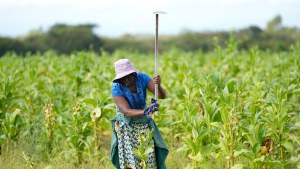 Food and Agriculture
Food and Agriculture
To ensure the sustainability of the global food and agriculture system, farmers must embrace diversification.
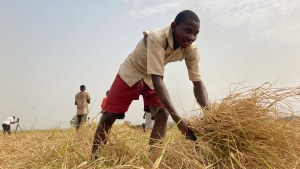 Food and Agriculture
Food and Agriculture
We need smart and efficient food systems to preserve the Earth—are young people the silver bullet?
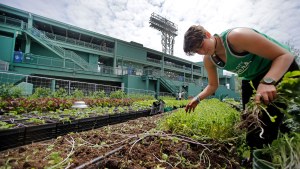 Food and Agriculture
Food and Agriculture
The Youth in Agriculture podcast examines new innovations required to improve the food system.
